
Discover the Alpine Charm of Alpe d'Huez
Alpe d'Huez, nestled in the French Alps, is a paradise for outdoor enthusiasts. This charming mountain resort is known for its stunning views and diverse activities. With an elevation of 1,860 meters, it provides breathtaking panoramas, especially from the Pic Blanc summit at 3,330 meters. The view stretches across one-fifth of France, including the Mont Blanc and the Massif Central. In winter, Alpe d'Huez transforms into a snowy playground. It boasts over 250 kilometers of ski slopes, catering to all levels from beginners to experts. The famous Sarenne run, the longest black run in the Alps, offers a thrilling challenge. Besides skiing, you can enjoy snowboarding, ice skating, and even dog sledding. Summer in Alpe d'Huez is equally exciting. The area becomes a haven for hikers, mountain bikers, and paragliders. The resort is part of the Tour de France route, making it a cyclist’s dream. The scenic trails and lush landscapes are perfect for nature lovers. Don't miss the opportunity to explore the charming alpine villages and indulge in local French cuisine at cozy mountain restaurants. Alpe d'Huez is not just about outdoor activities. The resort has a lively après-ski scene with numerous bars, clubs, and events. You can unwind at a spa or take a dip in the heated outdoor pool. The local culture and festivals add a unique touch to your visit, ensuring a memorable experience.
Local tips in Alpe d'Huez
- Visit the Pic Blanc summit for panoramic views that cover one-fifth of France.
- Try the Sarenne run, the longest black run in the Alps, for an unforgettable skiing experience.
- Book accommodation early during the Tour de France to secure the best spots.
- Explore the local villages and taste traditional French mountain cuisine.
- Take advantage of the resort's lively après-ski scene and numerous spas for relaxation.
Discover the Alpine Charm of Alpe d'Huez
Alpe d'Huez, nestled in the French Alps, is a paradise for outdoor enthusiasts. This charming mountain resort is known for its stunning views and diverse activities. With an elevation of 1,860 meters, it provides breathtaking panoramas, especially from the Pic Blanc summit at 3,330 meters. The view stretches across one-fifth of France, including the Mont Blanc and the Massif Central. In winter, Alpe d'Huez transforms into a snowy playground. It boasts over 250 kilometers of ski slopes, catering to all levels from beginners to experts. The famous Sarenne run, the longest black run in the Alps, offers a thrilling challenge. Besides skiing, you can enjoy snowboarding, ice skating, and even dog sledding. Summer in Alpe d'Huez is equally exciting. The area becomes a haven for hikers, mountain bikers, and paragliders. The resort is part of the Tour de France route, making it a cyclist’s dream. The scenic trails and lush landscapes are perfect for nature lovers. Don't miss the opportunity to explore the charming alpine villages and indulge in local French cuisine at cozy mountain restaurants. Alpe d'Huez is not just about outdoor activities. The resort has a lively après-ski scene with numerous bars, clubs, and events. You can unwind at a spa or take a dip in the heated outdoor pool. The local culture and festivals add a unique touch to your visit, ensuring a memorable experience.
When is the best time to go to Alpe d'Huez?
Iconic landmarks you can’t miss
Compagnie du Mont Blanc
Ascend to breathtaking heights for panoramic Alpine views and unique experiences at the Aiguille du Midi in Chamonix-Mont-Blanc.
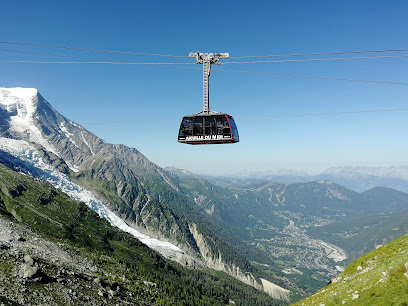
Alps
Discover the breathtaking beauty and rich history of the Alps, a majestic mountain range spanning across eight European countries.
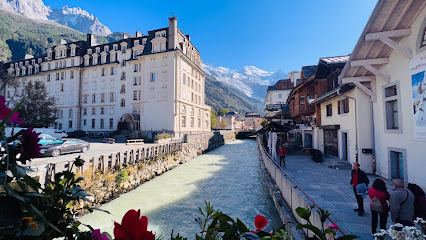
Club Med Alpe d'Huez - French Alps
Experience Alpine luxury at Club Med Alpe d'Huez: endless slopes, stunning views, and all-inclusive fun in the heart of the French Alps.

Grandes Rousses Hotel & Spa
Experience Alpine luxury at Grandes Rousses Hotel & Spa: gourmet dining, spa, and breathtaking mountain views in Alpe d'Huez.
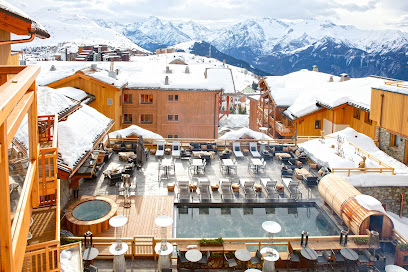
Hôtel Le Pic Blanc
Discover luxury and adventure at Hôtel Le Pic Blanc, your gateway to the stunning French Alps, perfect for skiing, hiking, and relaxation.
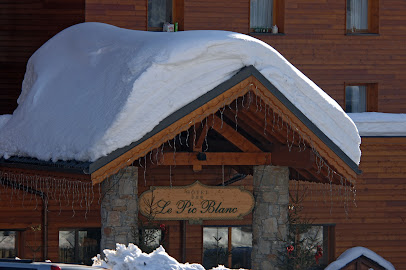
SATA Remontées mécaniques de l'Alpe d'Huez
Experience the thrill of the French Alps with SATA Remontées mécaniques, your gateway to Alpe d'Huez's slopes and stunning panoramic views.
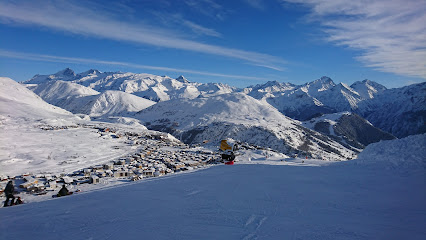
Parc du Château de Vizille
Discover history and nature at Parc du Château de Vizille, a beautiful park surrounding a historic château near Grenoble.
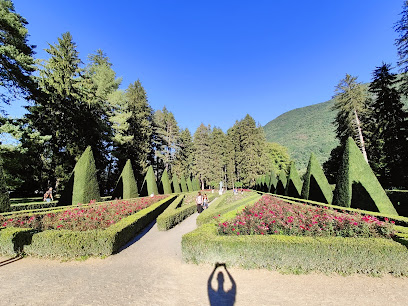
sports and congress
A hub for sports, culture, and events in the heart of the French Alps, offering diverse activities for all ages and interests.
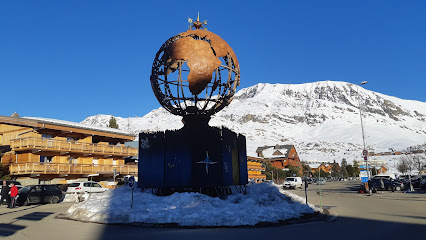
Village Club MMV les Bergers
Slopeside comfort and convenience at this Alpe d'Huez hotel, offering easy access to world-class skiing and family-friendly amenities.
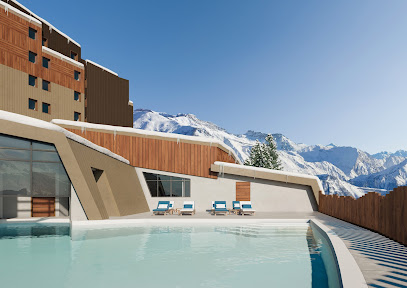
Le Castillan
Experience Alpine charm at Le Castillan in Alpe d'Huez: cozy rooms, stunning views, and easy access to slopes and trails.

La grotte de glace
Discover a magical world of ice and snow at Alpe d'Huez's Grotte de Glace, a unique mountaintop attraction featuring stunning ice sculptures.
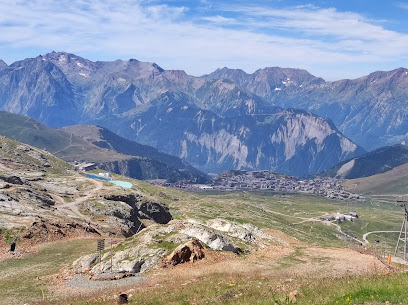
PopAlp
Experience a Pop Art-inspired stay in the French Alps at PopAlp, a unique hotel in Alpe d'Huez offering modern comfort and vibrant design.
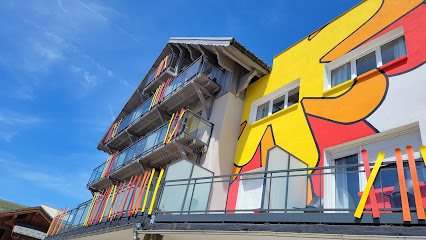
Office de Tourisme Alpe d'Huez
Your information source for Alpe d'Huez adventures: ski passes, bus tickets, hiking guides, and local expertise in the heart of the French Alps.
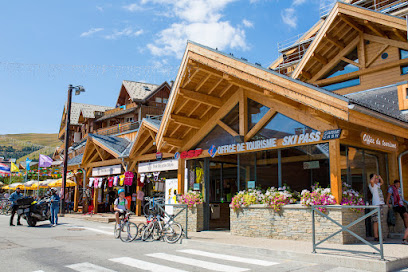
PARC AVENTURE OISANS
Experience high-flying thrills and stunning alpine views at Parc Aventure Oisans, the ultimate treetop adventure in Le Bourg-d'Oisans.
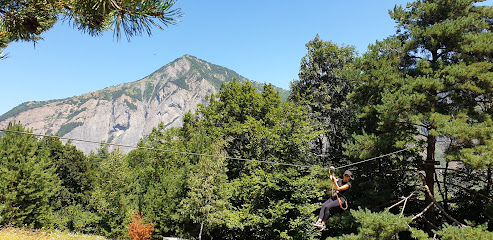
Refuge de la Fare
Discover the timeless charm of Refuge de la Fare, a historic alpine haven in the heart of the French Grandes Rousses mountains.
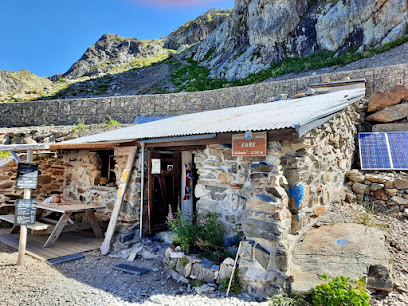
Unmissable attractions to see
Le Lac Bleu
Discover the mesmerizing turquoise waters of Le Lac Bleu in the French Alps, a serene alpine escape offering breathtaking views and tranquil hiking trails near Le Bourg-d'Oisans.
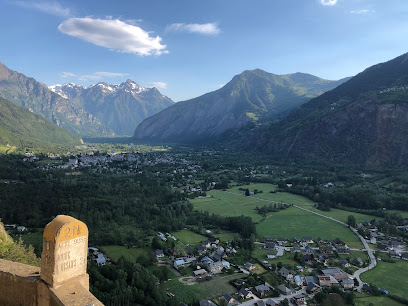
Alpes d'Huez
Experience the thrill of alpine adventures in Alpe d'Huez, where sunshine meets snow, offering world-class skiing, cycling, and breathtaking panoramic views year-round.
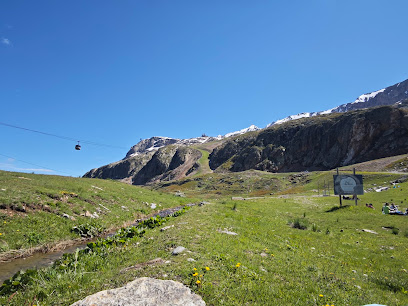
Notre-Dame des Neiges, L'Alpe d'Huez
Experience the tranquil beauty and rich architectural heritage of Notre-Dame des Neiges, a must-visit Catholic church in L'Alpe d'Huez.
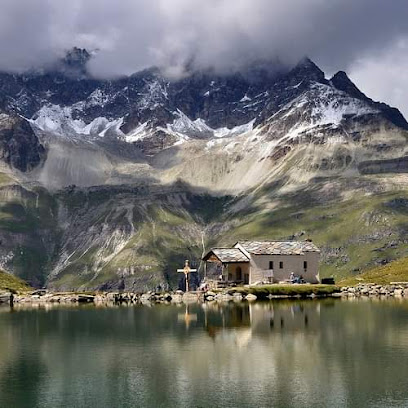
Site archéologique de Brandes
Explore the fascinating ruins of a medieval silver mining village nestled in the French Alps near Alpe d'Huez, offering a unique glimpse into the lives of its industrious inhabitants.
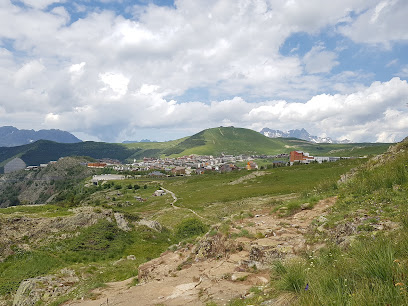
Alpe huez
Discover Alpe d'Huez, the 'Island of the Sun' in the French Alps: a year-round destination offering world-class skiing, thrilling cycling, stunning hiking, and a rich mountain history.
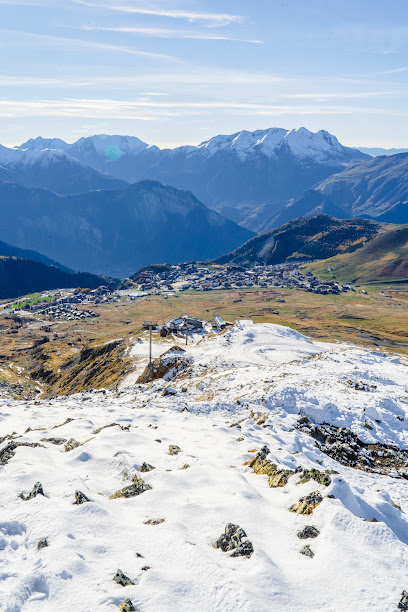
Sentier Panoramique
Discover breathtaking panoramic views along this accessible hiking trail in Huez, France, perfect for families and nature enthusiasts seeking an unforgettable Alpine experience.
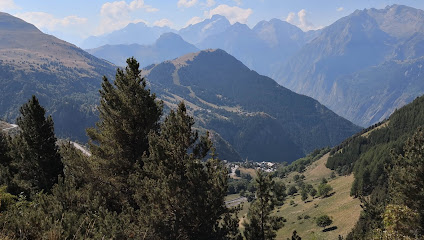
Signal de Villard
Experience breathtaking panoramic views from the Signal de Villard, a year-round alpine destination offering hiking, skiing, and stunning scenery in the heart of the Alpe d'Huez Grand Domaine.
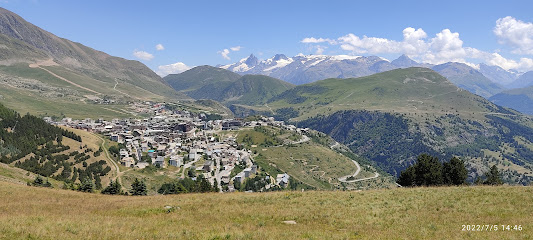
Lac des Bergers
Discover the serene beauty of Lac des Bergers near Alpe d'Huez: a picturesque alpine lake perfect for leisurely strolls, family picnics, and breathtaking mountain views.
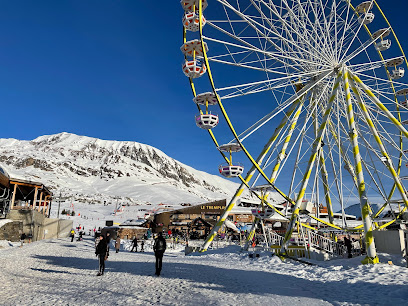
Rond Point de l'Europe
Experience the breathtaking beauty of the French Alps at Rond Point de l'Europe in Huez, a vibrant gateway to year-round adventure and stunning panoramic views.
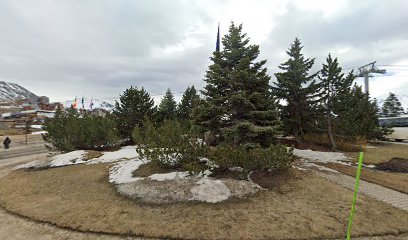
Tubing des Bergers
Experience the thrill of alpine sliding at Tubing des Bergers in Alpe d'Huez, offering a unique and accessible adventure for all ages amidst stunning mountain scenery and village charm.
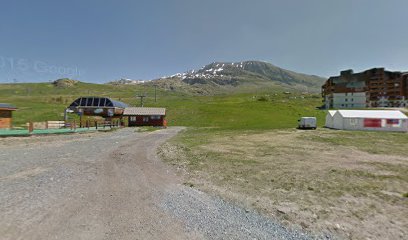
Table Pique Nique
A scenic picnic spot on the Col de Sarenne, near Alpe d'Huez, offering breathtaking mountain views and a tranquil escape in the French Alps, perfect for cyclists, drivers, and hikers.
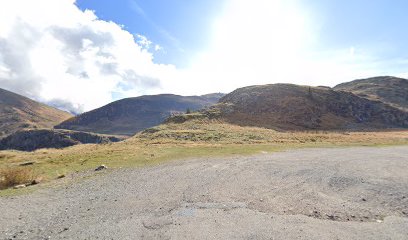
enfant Garden
Discover Enfant Garden in Huez, Alpe d'Huez: a delightful alpine park offering children a safe and engaging space for play and exploration amidst stunning mountain scenery.
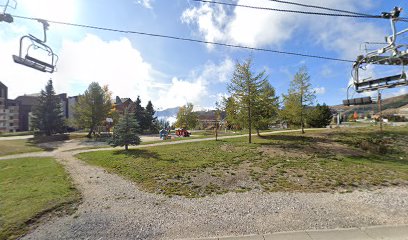
ski lift
Experience the thrill of the French Alps with Alpe d'Huez's modern ski lift system, providing access to 250km of pistes, stunning views, and year-round mountain adventures.
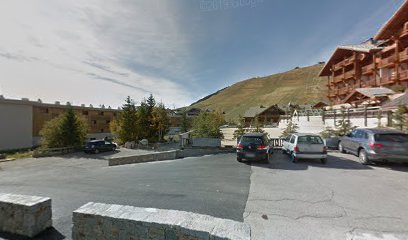
Route des Lacs
Discover the breathtaking beauty of the French Alps on the Route des Lacs near Alpe d'Huez, a scenic hiking area with pristine lakes and panoramic mountain views.
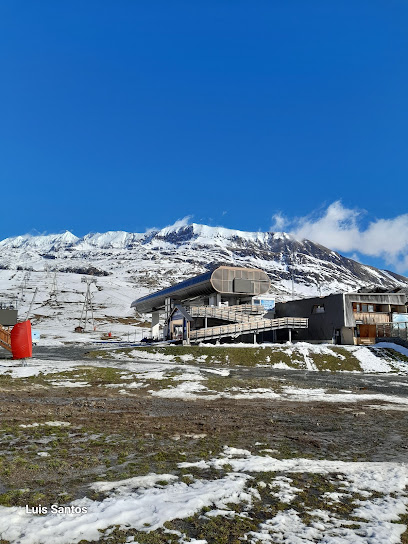
Bend 0 - Biking to Alpe d’Huez
Discover Alpe d'Huez: A legendary alpine destination offering world-class skiing, iconic cycling climbs, and breathtaking mountain scenery in the heart of the French Alps, year-round.
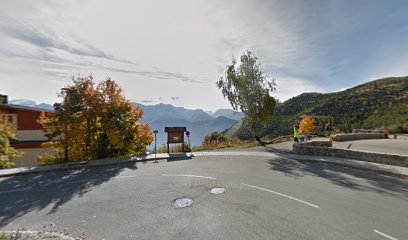
Essential places to dine
La Folie Douce Alpe d'Huez - Bar et Restaurants
Experience the best of alpine dining at La Folie Douce Alpe d'Huez – where exquisite French cuisine meets vibrant live entertainment in a stunning mountain setting.
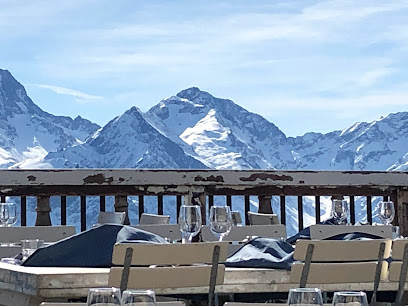
La Cabane
Experience exquisite French cuisine at La Cabane in Alpe d'Huez – where culinary tradition meets alpine charm amidst breathtaking mountain views.
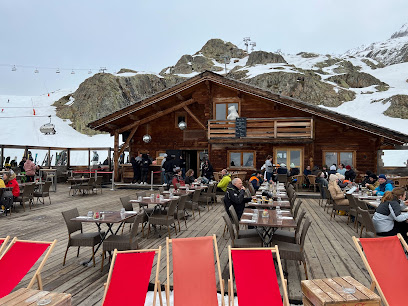
Chantebise 2100
Experience exquisite French cuisine paired with local brews at Chantebise 2100 in Alpe D'Huez's stunning alpine setting.
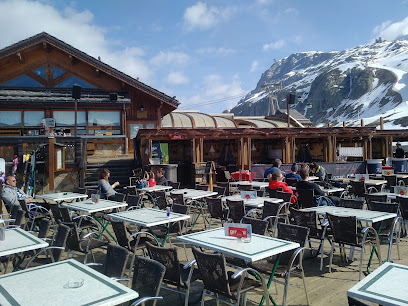
Au Grenier
Experience authentic French dining at Au Grenier in Huez, where fondue and raclette delight every palate amidst charming alpine scenery.
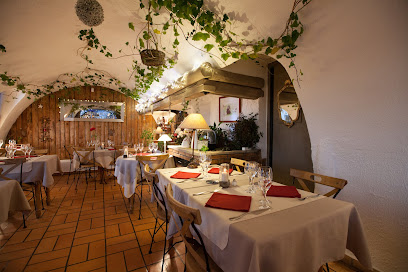
Chalet Du Lac Besson
Discover authentic French cuisine at Chalet Du Lac Besson, where alpine beauty meets culinary excellence in Huez.
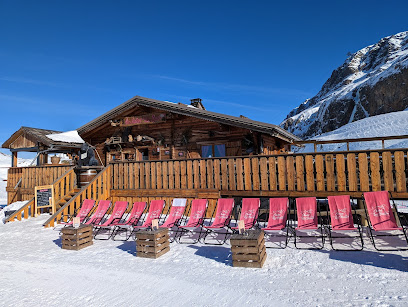
La Crémaillère L’Alpe d’Huez
Experience exquisite French and Mediterranean cuisine at La Crémaillère L’Alpe d’Huez in the heart of the French Alps.
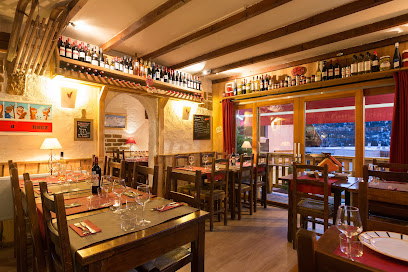
La Plage des Neiges
Experience exquisite alpine dining at La Plage des Neiges in Huez - where local flavors meet stunning mountain views.
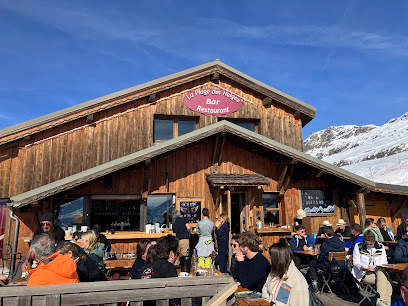
AU MONTAGNARD
Experience exquisite alpine cuisine at Au Montagnard - where local flavors meet stunning mountain views in Huez.
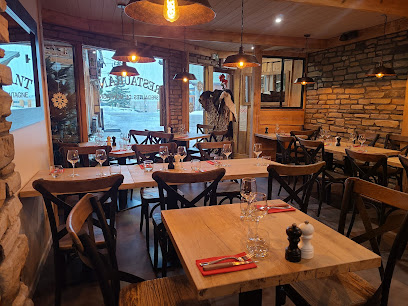
Restaurant La Petite Taverne
Experience the essence of French cuisine at Restaurant La Petite Taverne in Huez, where every meal is a celebration of local flavors.
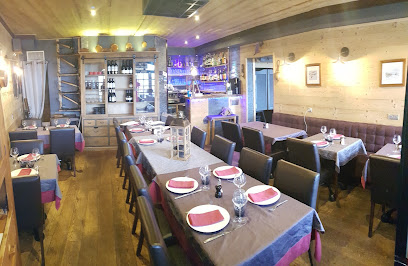
Restaurant La Pomme de Pin
Experience authentic French cuisine and alpine charm at Restaurant La Pomme de Pin in beautiful Huez.
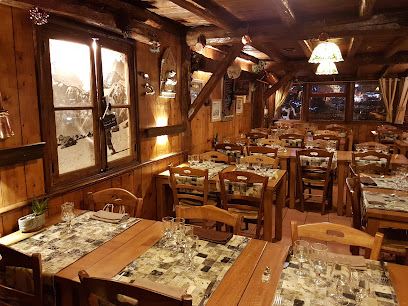
L’Empreinte Restaurant Alpe d'Huez
Experience exceptional modern French dining at L’Empreinte Restaurant Alpe d'Huez – where tradition meets innovation in every bite.
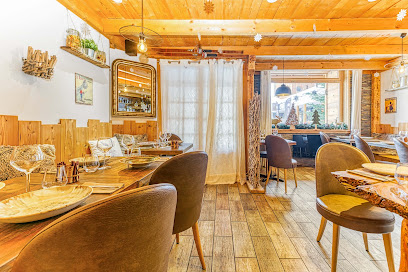
Le Taburle
Experience exquisite dining at Le Taburle in Huez – where local flavors meet alpine charm in a stylish setting.
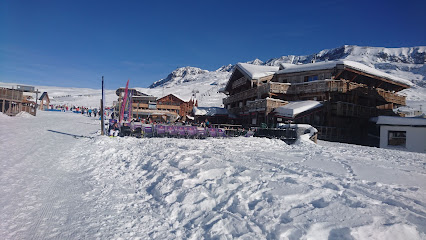
Le 37
Experience authentic French cuisine at Le 37 in Huez—where exquisite flavors meet stunning mountain views.
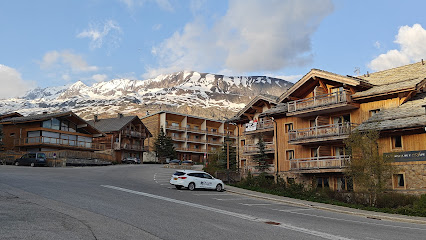
L'Authentique
Experience authentic French cuisine in the heart of Huez at L'Authentique – where culinary artistry meets alpine charm.
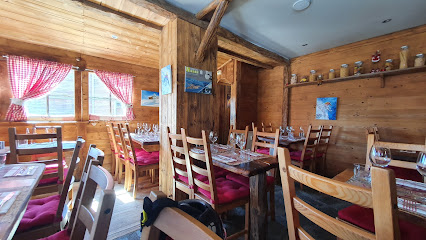
Restaurant Le Génépi Alpe d'Huez
Discover exquisite French cuisine at Restaurant Le Génépi in Alpe d'Huez – where local flavors meet breathtaking alpine views.
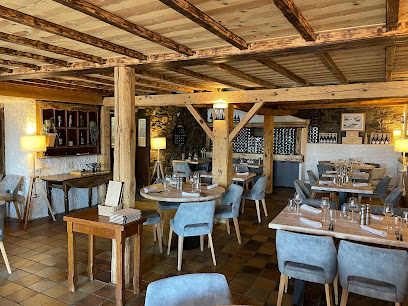
Markets, malls and hidden boutiques
Centre commercial Les Bergers
Explore Centre Commercial Les Bergers: A shopping paradise in Huez offering a blend of local culture, dining, and leisure.
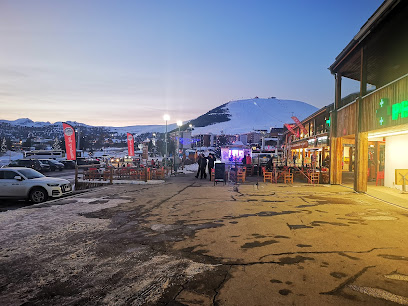
INTERSPORT - ALPE D'HUEZ - LES BERGERS
Discover your alpine adventure with top-quality ski and outdoor sports rentals at Intersport - Alpe D'Huez - Les Bergers in the heart of the French Alps.
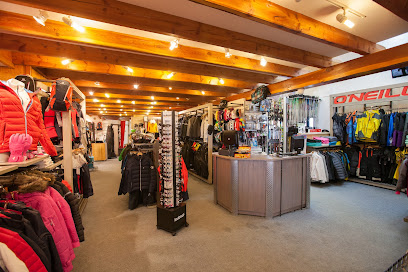
Carrefour Montagne Alpe d'Huez
Discover Carrefour Montagne Alpe d'Huez: A premier supermarket offering fresh foods, local delicacies, and an array of essentials for your Alpine adventure.
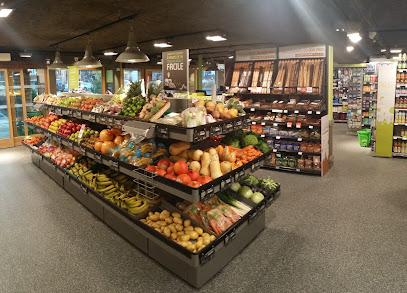
Cyril's sports - Skimium
Explore the slopes of Alpe d'Huez with top-notch gear from Cyril's Sports, your trusted mountain gear store for ski and snowboard rentals.
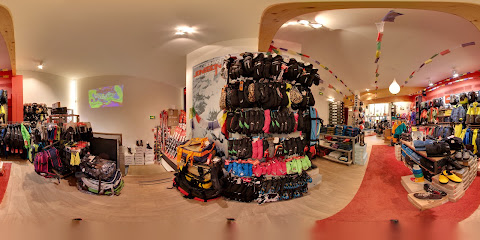
Boulangerie Pâtisserie Ker Alp'Pain
Discover exquisite French pastries and artisan breads at Boulangerie Pâtisserie Ker Alp'Pain in Huez, a delightful stop for every traveler.
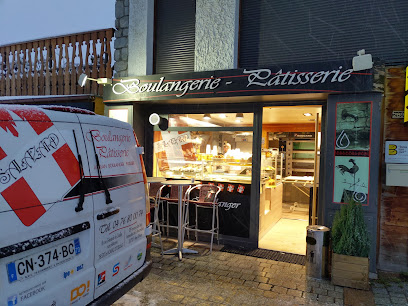
Pâtisserie Confiserie Jannin
Discover the sweet side of Huez at Pâtisserie Confiserie Jannin, where every pastry tells a story of French culinary artistry and alpine charm.
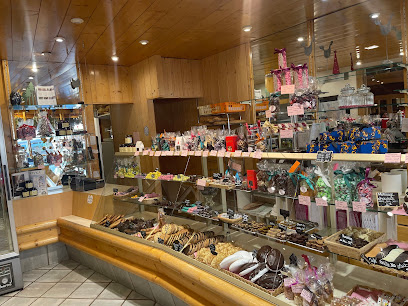
Concept - Location ski Alpe d'Huez
Discover Alpe d'Huez, a stunning alpine paradise offering world-class skiing, mountain biking, and vibrant après-ski activities in the heart of the French Alps.
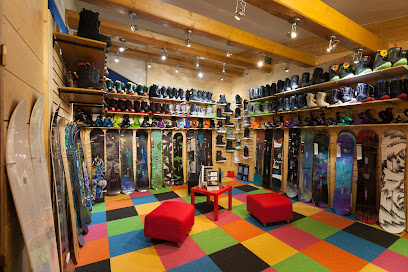
Skimium - CHIC & PERFORMANCE NOEL SPORTS Alpe d'Huez
Discover premier ski and snowboard rentals at Chic & Performance in Alpe d'Huez, where adventure and quality meet in the heart of the French Alps.
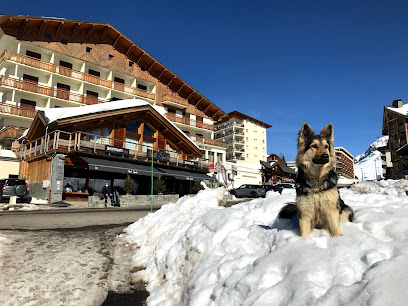
Skimium - ALTITUDE SPORTS ECLOSE Alpe d'Huez
Discover the ultimate ski rental service in Alpe d'Huez, Altitude Sports Eclose, for quality gear and expert advice in the heart of the Alps.
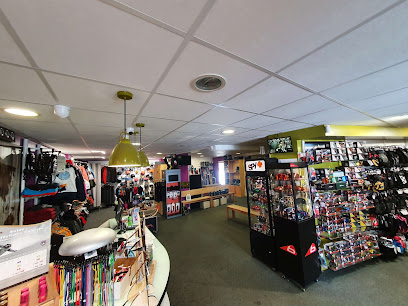
Magasin Hors Piste
Explore Huez's premier ski shop, Magasin Hors Piste, offering expert gear and unparalleled service for your winter adventures.
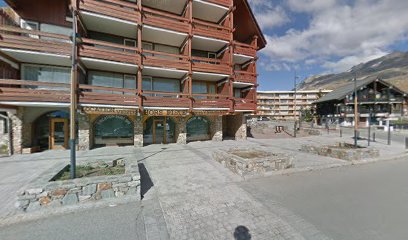
La bamboche
Discover La Bamboche in Huez: A charming wine cellar offering exquisite wines, local beers, and unique souvenirs in a cozy alpine atmosphere.
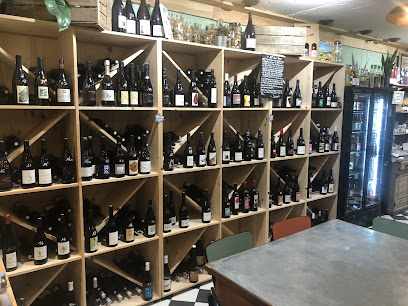
Location VTTAE, Enduro, DH, Trott' Electrique - ALTITUDE SPORTS Les bergers - Alpe d'Huez
Discover thrilling biking adventures and premium outdoor gear at Altitude Sports in the heart of Alpe d'Huez's breathtaking landscapes.
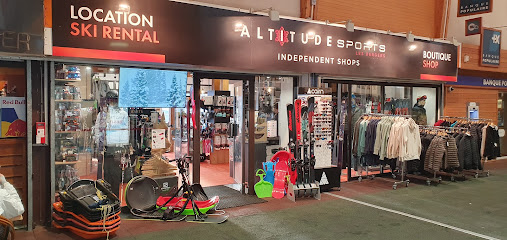
White Shop
Explore the White Shop in Huez for the best in fashion accessories, snowboard gear, and sportswear, embodying alpine adventure and style.
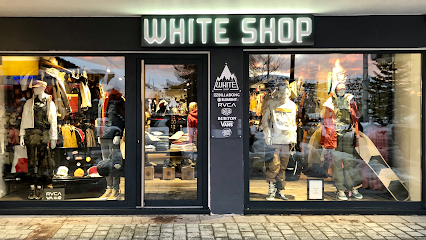
Location VTTAE, Enduro, DH, Trott' Electrique - Départ VTT - ALTITUDE SPORTS Alpe d'Huez
Discover biking adventures and quality gear at Altitude Sports, your go-to stop in Alpe d'Huez for an unforgettable outdoor experience.
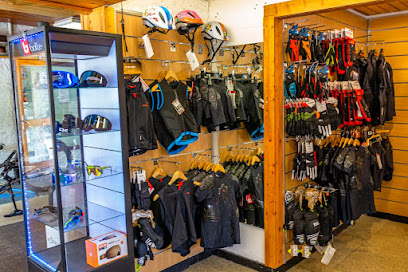
Tabac Loto Presse du Vieil Alpe d'Huez
Explore Alpe d'Huez at Tabac Loto Presse, your go-to destination for local souvenirs, snacks, and a taste of mountain life.
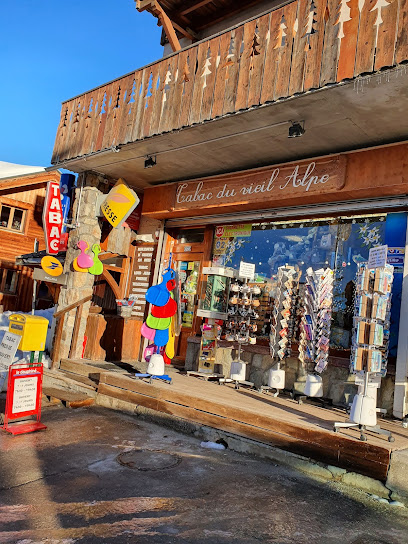
Essential bars & hidden hideouts
Le Tremplin
Discover the vibrant atmosphere and Italian flavors at Le Tremplin, a charming bar and restaurant in the heart of Huez.
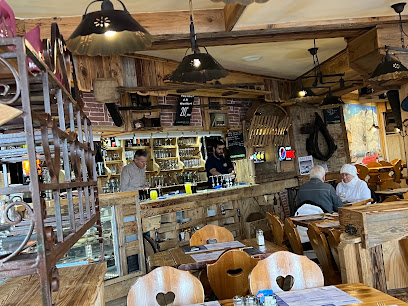
Chalet Du Lac Besson
Experience exquisite French cuisine at Chalet Du Lac Besson, a picturesque restaurant in the heart of the Alps, surrounded by stunning alpine views.
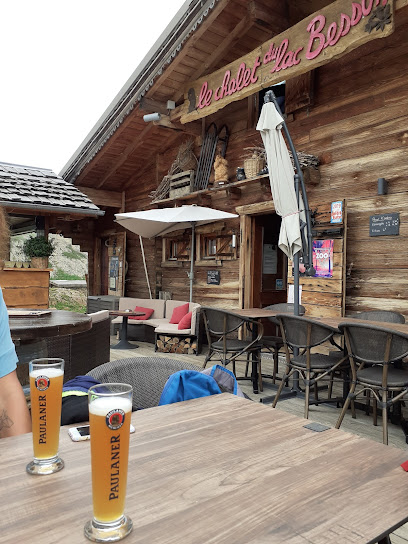
Restaurant La Petite Taverne
Experience the essence of French cuisine at Restaurant La Petite Taverne, where every dish tells a story amidst stunning Alpine views.
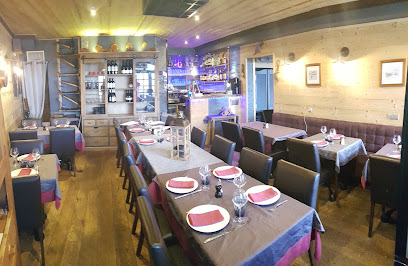
Restaurant La Pomme de Pin
Experience the flavors of France at Restaurant La Pomme de Pin, a cozy spot in Huez perfect for après-ski dining and relaxation.
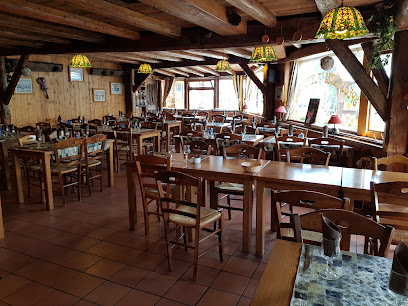
Restaurant Le Génépi Alpe d'Huez
Experience the essence of French cuisine at Restaurant Le Génépi, a cozy dining spot in Alpe d'Huez, perfect for food lovers and adventurers alike.
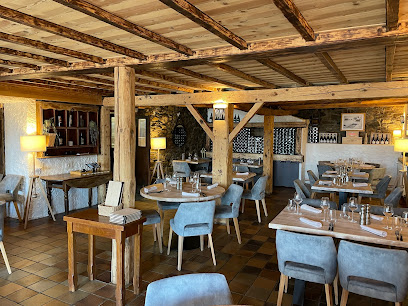
Au Puits des Saveurs
Experience the exquisite flavors of France at Au Puits des Saveurs, a top-rated restaurant in Huez, perfect for culinary enthusiasts.
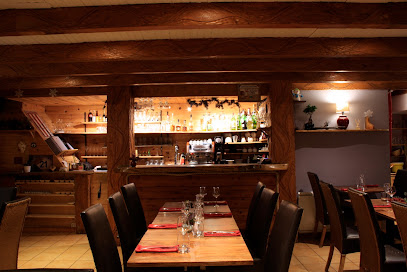
Les Caves de l'Alpe
Discover the vibrant nightlife at Les Caves de l'Alpe, where music, dancing, and unforgettable moments await in the heart of the French Alps.
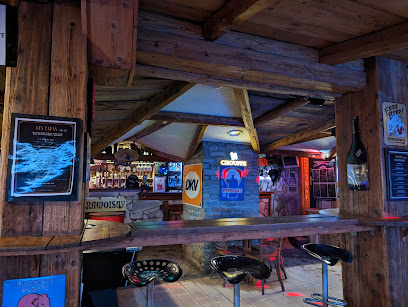
Smithy's Tavern Bar and Restaurant
Discover Smithy's Tavern in Alpe d'Huez: Where tasty grill dishes meet lively nightlife and unforgettable experiences await.
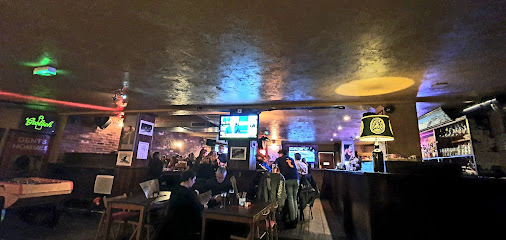
Camp De Base Pic Blanc - Alpe d'Huez
Discover the lively Camp De Base Pic Blanc bar and restaurant in Alpe d'Huez, perfect for après-ski relaxation and delicious dining.
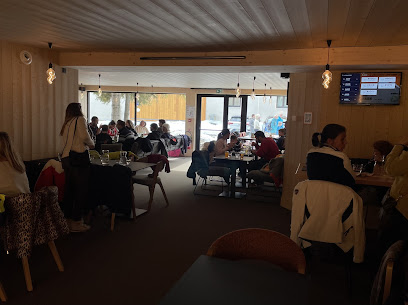
Igloo Club Alpe d’Huez
Dive into the exhilarating nightlife of Igloo Club Alpe d’Huez, where unforgettable parties and stunning alpine views come together.
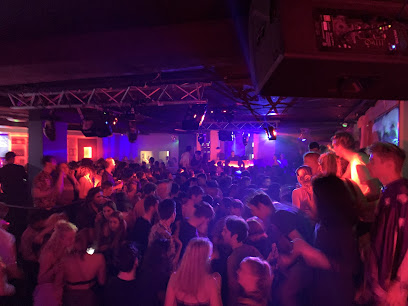
L'Agua
Experience the vibrant atmosphere and breathtaking views at L'Agua, Huez's premier bar for relaxation and socializing.
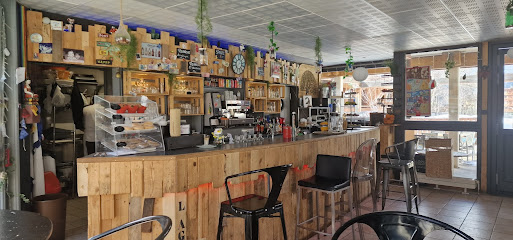
Indiana Bar
Discover the vibrant Indiana Bar in Huez, a perfect blend of lively atmosphere and delicious fast food, ideal for unwinding after mountain adventures.
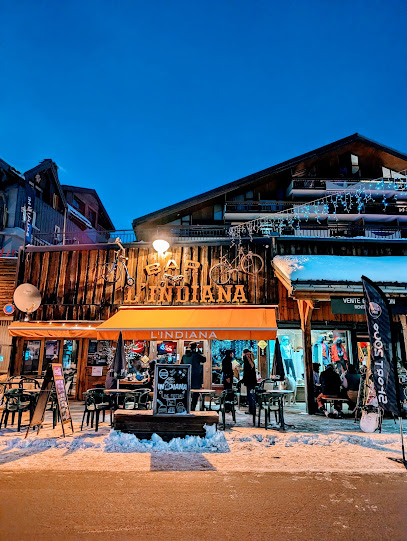
Free Ride Pub
Discover the cozy charm of Free Ride Pub in Huez, where great drinks and alpine ambiance meet for an unforgettable après-ski experience.
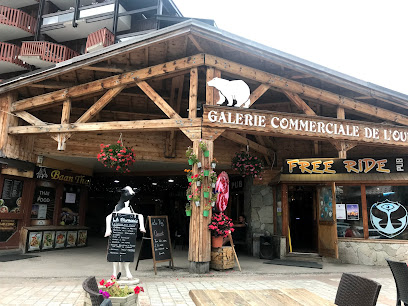
Underground Bar
Experience the vibrant nightlife at Underground Bar in Huez, where friendly vibes and great drinks create unforgettable moments amidst stunning mountain views.
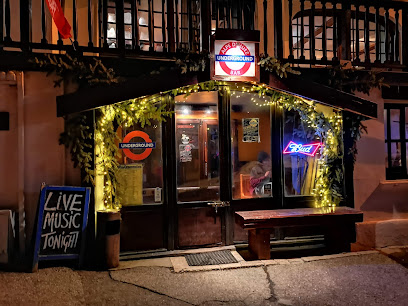
Le Zoo Bar
Discover the vibrant nightlife at Le Zoo Bar in Huez, where every evening promises great drinks, lively music, and unforgettable memories.
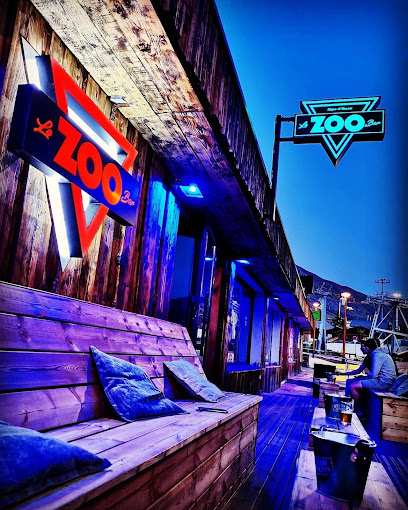
Local Phrases about Alpe d'Huez
-
- HelloBonjour
[bon-zhoor] - GoodbyeAu revoir
[oh ruh-vwahr] - YesOui
[wee] - NoNon
[noh] - Please/You're welcomeS'il vous plaît / De rien
[see voo pleh / deh ryen] - Thank youMerci
[mehr-see] - Excuse me/SorryExcusez-moi / Désolé
[ex-kyoo-zay mwah / deh-zoh-lay] - How are you?Comment ça va?
[koh-mohn sah vah?] - Fine. And you?Bien. Et vous?
[byen. eh voo?] - Do you speak English?Parlez-vous anglais?
[par-lay voo ahn-glay?] - I don't understandJe ne comprends pas
[zhuh nuh kohm-prahnd pah]
- HelloBonjour
-
- I'd like to see the menu, pleaseJe voudrais voir la carte, s'il vous plaît
[zhuh voo-dray vwah la kart, see voo pleh] - I don't eat meatJe ne mange pas de viande
[zhuh nuh mahnj pah duh vee-ahnd] - Cheers!Santé!
[sahn-tay] - I would like to pay, pleaseJe voudrais payer, s'il vous plaît
[zhuh voo-dray pay-ay, see voo pleh]
- I'd like to see the menu, pleaseJe voudrais voir la carte, s'il vous plaît
-
- Help!Au secours!
[oh suh-koor] - Go away!Allez-vous en!
[al-ay vooz ahn] - Call the Police!Appelez la police!
[ah-peh-lay lah poh-lees] - Call a doctor!Appelez un médecin!
[ah-peh-lay uh may-deh-sahn] - I'm lostJe suis perdu
[zhuh swee pair-doo] - I'm illJe suis malade
[zhuh swee mah-lahd]
- Help!Au secours!
-
- I'd like to buy...Je voudrais acheter...
[zhuh voo-dray ah-shet-ay] - I'm just lookingJe regarde juste
[zhuh ruh-gard zhuhst] - How much is it?Combien ça coûte?
[kohm-byen sah koot?] - That's too expensiveC'est trop cher
[say troh shair] - Can you lower the price?Pouvez-vous baisser le prix?
[poo-vez voo bay-say luh pree?]
- I'd like to buy...Je voudrais acheter...
-
- What time is it?Quelle heure est-il?
[kell err eh-teel] - It's one o'clockIl est une heure
[eel ehz oon err] - Half past (10)Dix heures et demie
[deez errz ay duh-mee] - MorningMatin
[mah-tahn] - AfternoonAprès-midi
[ah-pray mee-dee] - EveningSoir
[swahr] - YesterdayHier
[yehr] - TodayAujourd'hui
[oh-zhoor dewee] - TomorrowDemain
[duh-mahn] - 1Un
[uh] - 2Deux
[duh] - 3Trois
[twah] - 4Quatre
[kat] - 5Cinq
[sank] - 6Six
[sees] - 7Sept
[set] - 8Huit
[weet] - 9Neuf
[nuf] - 10Dix
[dee]
- What time is it?Quelle heure est-il?
-
- Where's a/the...?Où se trouve...?
[oo suh troov] - What's the address?Quelle est l'adresse?
[kell eh la-dress] - Can you show me (on the map)?Pouvez-vous me montrer (sur la carte)?
[poo-vez voo muh mohn-tray (sur la kart)] - When's the next (bus)?Quand est le prochain (bus)?
[kohn eh luh proh-shahn (bus)] - A ticket (to ....)Un billet (pour ....)
[un bee-yay (poor)]
- Where's a/the...?Où se trouve...?
History of Alpe d'Huez
-
Alpe d'Huez, nestled in the French Alps, traces its origins back to the medieval period. The area was initially settled by shepherds and farmers, taking advantage of the fertile mountain pastures. The small village of Huez, from which Alpe d'Huez gets its name, was first mentioned in historical records in the 11th century.
-
In the late 19th century, Alpe d'Huez experienced a significant transformation due to the discovery of silver and lead deposits. The mining industry brought economic growth and an influx of workers to the region. The mining operations left a lasting legacy, with several old tunnels and mining relics still visible today.
-
The early 20th century marked the beginning of Alpe d'Huez as a winter sports destination. The first ski lift was installed in 1936, and the area quickly gained popularity among skiing enthusiasts. The development of ski infrastructure continued through the decades, solidifying Alpe d'Huez's reputation as a premier ski resort.
-
During World War II, the remote and rugged terrain of Alpe d'Huez provided a strategic advantage for the French Resistance. The local population played a crucial role in supporting resistance fighters, offering shelter and aid. This period of history is commemorated by several monuments and memorials in the area.
-
Alpe d'Huez is perhaps most famous for its association with the Tour de France. Since its first inclusion in the race in 1952, the climb up to Alpe d'Huez has become one of the most iconic and challenging stages of the Tour. The 21 hairpin bends ascending to the resort are legendary among cyclists and spectators alike.
-
In the latter half of the 20th century, Alpe d'Huez continued to expand as a comprehensive tourist destination. Modern amenities, hotels, and restaurants were developed to cater to the growing number of visitors. Today, Alpe d'Huez is a year-round destination, offering a range of activities from skiing and snowboarding in the winter to hiking and mountain biking in the summer.
-
Alpe d'Huez hosts a variety of cultural events throughout the year, including the renowned Alpe d'Huez International Comedy Film Festival. This annual event attracts filmmakers and actors from around the world, adding a vibrant cultural dimension to the area's appeal. In addition to film festivals, Alpe d'Huez also features music festivals, local fairs, and traditional celebrations that highlight the rich cultural heritage of the region.
Alpe d'Huez Essentials
-
Alpe d'Huez is located in the Central French Alps. The nearest major airport is Grenoble Alpes-Isère Airport, approximately 100 kilometers away. You can also fly into Lyon-Saint Exupéry Airport or Geneva Airport, both of which are about a two-hour drive. From these airports, you can rent a car or take a shuttle service directly to Alpe d'Huez. During the ski season, there are often direct bus services from these airports to the resort. Another option is to take a train to Grenoble, from where you can take a bus or taxi to Alpe d'Huez.
-
Once in Alpe d'Huez, you can navigate the area using the free shuttle buses that run regularly and connect different parts of the resort. For more flexibility, consider renting a car, especially if you plan to explore surrounding villages and attractions. Taxis are also available but can be expensive. During the ski season, ski lifts and gondolas are the main modes of transportation for skiers and snowboarders.
-
The official currency in France is the Euro (EUR). Credit and debit cards are widely accepted in hotels, restaurants, and shops in Alpe d'Huez. However, it's advisable to carry some cash for smaller establishments and for emergencies. ATMs are available throughout the resort, so you can withdraw cash as needed.
-
Alpe d'Huez is generally safe for tourists, with a low crime rate. However, it is always wise to take standard precautions. Keep an eye on your belongings in crowded places and avoid leaving valuables unattended. While there are no specific high-crime areas, it's best to stay vigilant, especially in busy tourist spots. The resort has a strong police presence and security measures to ensure the safety of visitors.
-
In case of an emergency, dial 112 for immediate assistance. The resort has a medical center with doctors and nurses available to handle minor injuries and illnesses. For serious medical emergencies, you may need to be transported to a larger hospital in Grenoble. It is highly recommended to have travel insurance that covers medical emergencies and evacuation. Pharmacies are available in the resort for over-the-counter medications.
-
Fashion: Do dress appropriately for the weather. In winter, layers and waterproof gear are essential. Avoid wearing ski boots in restaurants and shops. Religion: Do respect religious sites and local customs. Although Alpe d'Huez is not known for religious conservatism, a respectful attitude is always appreciated. Public Transport: Do use the free shuttle buses within the resort. Don’t forget to check the schedule as they can vary. Greetings: Do greet people with a simple 'Bonjour' and a smile. It's a polite way to start any conversation. Eating & Drinking: Do try the local cuisine, including raclette and fondue. Don't forget to make a reservation if you plan to dine at popular restaurants during peak season.
-
To experience Alpe d'Huez like a local, consider visiting the weekly market held on Tuesdays and Thursdays, where you can buy local produce and artisanal goods. Engage with the locals, who are often happy to share tips about the best ski runs or hidden hiking trails. For a unique experience, visit the ice cave (Grotte de Glace) at 2,700 meters, which features stunning ice sculptures. Also, don't miss the chance to try night skiing on the floodlit slopes.
Trending Landmarks in Alpe d'Huez
-
Compagnie du Mont Blanc
-
Alps
-
Club Med Alpe d'Huez - French Alps
-
Grandes Rousses Hotel & Spa
-
Hôtel Le Pic Blanc
-
SATA Remontées mécaniques de l'Alpe d'Huez
-
Parc du Château de Vizille
-
sports and congress
-
Village Club MMV les Bergers
-
Le Castillan
-
La grotte de glace
-
PopAlp
-
Office de Tourisme Alpe d'Huez
-
PARC AVENTURE OISANS
-
Refuge de la Fare
Nearby Cities to Alpe d'Huez
-
Things To Do in Annecy
-
Things To Do in Lyon
-
Things To Do in Geneva
-
Things To Do in Turin
-
Things To Do in Avignon
-
Things To Do in Montreux
-
Things To Do in Vevey
-
Things To Do in Lausanne
-
Things To Do in Zermatt
-
Things To Do in Nice
-
Things To Do in Aix-en-Provence
-
Things To Do in Saint Roman
-
Things To Do in La Rousse
-
Things To Do in Larvotto
-
Things To Do in Les Moneghetti












